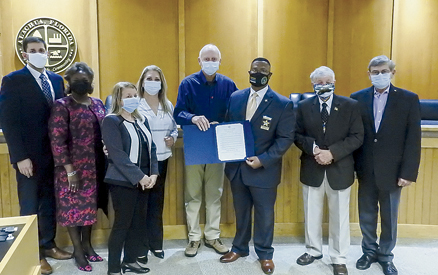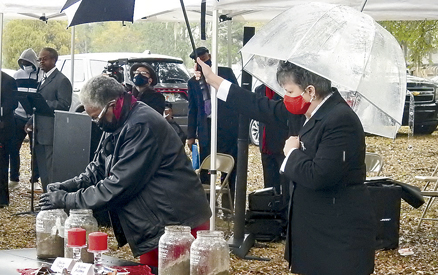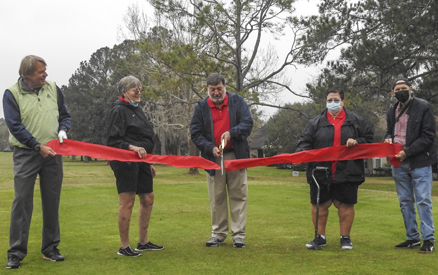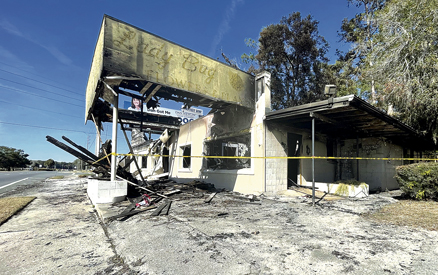Clovis Watson Jr. Day in Alachua
ALACHUA ‒ It was an evening of recognition at Alachua City Hall Monday as the Alachua City Commission held several special presentations to honor individuals who serve the community.
Alachua County Sheriff Clovis Watson Jr. was on hand as the Commission issued a proclamation declaring Feb. 8 Clovis Watson Jr. Day.
A lifelong Alachua resident, Watson grew up in the Merrillwood neighborhood, the fourth child of six in his family, attending elementary school in segregated Alachua County schools. As the tumultuous 1970s ushered in school segregation in the area, Watson was in the first class to be integrated in 1970.
As a teenager he worked packing fruit during the school year to help his father who had two jobs, and during the summer he was cropping tobacco and picking squash until dark for $10 a day to help pay for school clothes. He graduated from Santa Fe High School and later attended Santa Fe College where he received an Associate degree in Criminal Justice Technology. He continued his education, earning Masters Degrees and attended Harvard University as a Doctoral candidate in Business and Government Administration.
Watson worked for the City of Alachua Police Department, eventually rising to the rank of Deputy Chief of Police. He left his position at the police department when he was appointed City Manager of Alachua in 2002, a position he held until his retirement. Watson also served as an adjunct professor of state and local government at Santa Fe College.
He was first elected to the Florida House of Representatives in 2012, where he was subsequently re-elected and served until he was termed out 2020. In 2020, Watson successfully ran for Alachua County Sheriff, defeating incumbent Sheriff Sadie Darnell with 59 percent of the vote in the Aug. 18 primary and ran unopposed in the general election.
Watson received a standing ovation from the audience after the proclamation was read by Alachua Mayor Gib Coerper. Watson spoke thanked the City for the honor, saying “What we have to do as leaders is help pull everybody up, to help recognize that they all have that same opportunity with drive, discipline, commitment, and education. I push that in every facet of my journey as a public servant. It is so very critical that we prepare the young people for the future and also pay homage to those who came before us to make all of this possible,” Watson said.
Referring to his role as sheriff, Watson said it is essential that in the law enforcement community, he and others command, not demand respect. He said it is crucial to have an open door, open ear, and open eye philosophy when leading, saying that his door is always open to hearing from the people he serves.
The Commission also honored local educators and the school crossing guards by declaring Feb. 9, 2021 as School Crossing Guard Appreciation Day for their role in protecting students from traffic on their journey to and from school.
Local Teachers of the Year were recognized representing each of Alachua's four public schools. The four teachers were accompanied by the principal of each school as they were awarded certificates honoring their work and dedication to their students. Alachua’s Teachers of the Year are Maria Tzounakos of Alachua Elementary School, Flo Bason of Irby Elementary School, Lisa Morris of Mebane Middle School, and Brian Barnhouse of Santa Fe High School.
State Senator Keith Perry was on hand delivering a preview of 2021 Florida Legislative Session, which runs March 2 – April 30, 2021. Perry said that while the cost associated with Covid-19 and lock down restrictions have severely impacted the local economy, businesses and state budgets, Florida is in much better shape than many other states.
Perry also spoke about the legislative process saying that the legislature considers up to 3,000 bills each session, although only some 200 bills will be passed and presented to the Governor for signature. “People can file whatever they want, it is up to the legislature to determine what is most important and affects the largest portion of the population.”
This session Perry is focusing on agriculture laws, criminal justice reform and early childhood education. Perry closed his remarks promising to keep local governments informed and welcoming their input on what their community’s needs are.
# # #
Email rcarson@
alachuatoday.com
Add a comment





